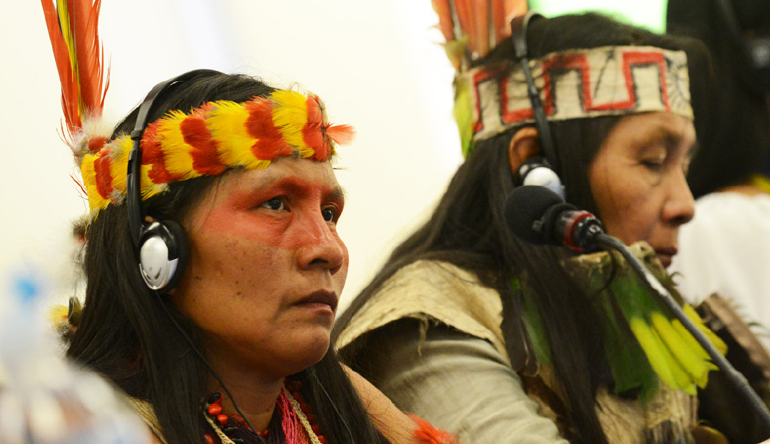Ensuring the primacy of human rights in trade and investment policies

CIDSE | 3 March 2017
Ensuring the primacy of human rights in trade and investment policies
by Markus Krajewski
EXECUTIVE SUMMARY
Introduction
While it is generally agreed that human rights and obligations of trade and investment agreements do not contradict each other per se, many commentators and political observers agree that trade and investment agreements may lead to policies and governmental measures with a negative impact on the full enjoyment of human rights and the State’s ability to respect, protect and fulfil these rights.
The United Nations (UN) Guiding Principles on Business and Human Rights recognise the potential tension between trade and investment policies and human rights obligations. While the Guiding Principles became the main reference for the business and human rights discourse, in 2014 the UN Human Rights Council adopted resolution 26/9 by which it decided “to establish an open-ended intergovernmental working group on transnational corporations and other business enterprises with respect to human rights, whose mandate shall be to elaborate an international legally binding instrument to regulate, in international human rights law, the activities of transnational corporations and other business enterprises”.
While the actual negotiations on the legally binding instrument are to begin in 2017, the Working Group held two informative sessions in 2015 and 2016 on the issues most relevant for the structure and scope of the treaty. During the second session of the Open-ended intergovernmental working group, a number of speakers and discussants raised the question of how a treaty on businesses and human rights might address the potential conflict between trade and investment policies and human rights, and called for treaty elements which would ensure the primacy of human rights.
The present study seeks to contribute to this debate in the context of the treaty process.
Part II of this study recalls the main areas of potential conflict between trade and investment policies and human rights, in particular trade and investment agreements. Part III explains how some of these conflicts could be addressed in reformed trade and investment agreements. As such reforms would not be sufficient, Part IV of the study develops and explains model clauses addressing investment and trade policies which could be included in a treaty on businesses and human rights.
The value of a treaty
The UN Guiding Principles call upon States to negotiate and conclude trade and investment agreements which do not impose undue restrictions on national policy space needed to respect, protect and fulfil human rights. However, the Guiding Principles are non-binding and so far, States have not fundamentally changed their treaty practices. For example, the Comprehensive Economic and Trade Agreement (CETA) between Canada and the EU does not contain any provisions which could be seen as an implementation of the UN Guiding Principles. Instead, most of CETA’s trade rules follow the classic model.
This seems to suggest that the voluntary approach of the UN Guiding Principles is not sufficient to ensure that States negotiate trade and investment agreements which ensure the primacy of human rights. Consequently, it would be beneficial from a human rights perspective if a treaty on businesses and human rights would establish binding obligations for States when developing new trade and investment agreements, and if it would structure the relationship between human rights and the trade and investment regime to ensure the former’s primacy.
Implications for investment
It is unlikely that rebalancing and restructuring the relationship between investment and trade rules on the one side, and human rights on the other, in a treaty on businesses and human rights will have negative effects on the trade and investment performance of the parties of this treaty.
A number of empirical studies could not find a significant impact of investment agreements on foreign direct investment. Hence, agreements with lesser investment protection will not necessarily lead to less foreign direct investment.
More importantly, establishing a supremacy of human rights does not indicate an investor-hostile regulatory environment. To the contrary, clarifying the relationship between trade and investment could add to a stable legal environment.
Model clauses for a treaty
To ensure the primacy of human rights, the treaty could contain provisions addressing three specific areas:
• Firstly, treaty provisions could regulate the relationship between trade and investment agreements and human rights through a specific supremacy clause or through requirements ensuring the observance of human rights in trade and investment disputes and through the incorporation of human rights obligations and clauses in future trade and investment agreements.
• Secondly, the treaty could require the States to conduct human rights impact assessments before, during and at the end of the negotiation of a new trade and investment treaty and periodically review the impact of such a treaty on human rights.
• Thirdly, the treaty on businesses and human rights could specify obligations of export credit and investment guarantee agencies.
Window of opportunity for new legal approaches
The international regime of trade and investment agreements is currently suffering from a significant legitimacy crisis, which should be considered as a window of opportunity for the introduction of new legal approaches to address the relationship between human rights and investment and trade policies. Reforming the investment and trade regime and establishing binding norms in a treaty on businesses and human rights are not mutually exclusive. Despite the current crisis of the trade and investment regime, it is safe to assume that these agreements will continue to exist and to exercise considerable influence on States. The treaty on businesses and human rights could therefore be used as an instrument to establish binding obligations on States to reform trade and investment agreements, to mitigate the potential negative impact of trade and investment agreements on the full enjoyment of human rights and to regulate the relationship between the two regimes in case of a conflict.





